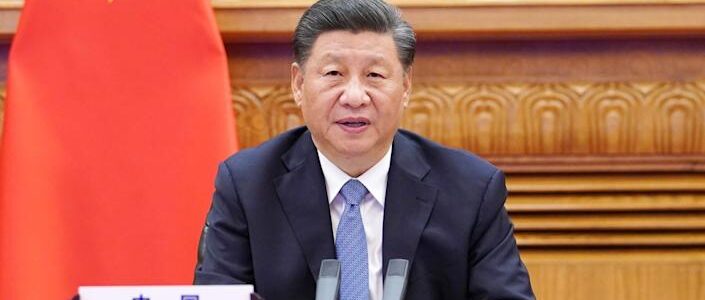
With the Communist Party’s endorsement last week of a resolution lauding him and his ideology, Chinese leader Xi Jinping has vaulted into a position of rare supremacy. The vote all but clinches his power to rule as long as he chooses over the country of 1.4 billion people.
Mr. Xi is “a man on a mission” who sees himself as “responsible for all the greatness in China today,” says Steve Tsang, director of the SOAS China Institute at the University of London. “There is clearly no intention of him retiring.”

The political victory enshrines Mr. Xi’s vision for the nation in a document meant to endure for decades to come, and puts him in a virtually unassailable position. Yet his dominance, bolstered by a growing personality cult, imposes an ideological conformity that carries risks for China, some observers warn.
“The cost of ideological governance is to dampen innovation and creativity,” says Timothy Cheek, a history professor and expert in modern China at the Institute of Asian Research at the University of British Columbia. “They get security at the price of creativity.”

A plenum of the ruling Communist Party’s more than 300-strong Central Committee, the locus of power in China, passed a resolution last week on the party’s “major achievements” since its founding 100 years ago. Its full text was published Tuesday.
It is hard to overstate the importance of the so-called historical resolution, only the third such document approved by the Central Committee since the party’s founding in 1921, experts say.
Mao Zedong, who led China’s communist revolution, orchestrated the first resolution in 1945 to criticize the party’s early founders. The second was secured in 1981 by then-paramount leader Deng Xiaoping, who used it to chastise Mr. Mao’s radicalism and pave the way for market-oriented economic reforms and China’s opening to the outside world.
A new brand of Marxism
The new resolution marks a radical departure from Mr. Deng’s pragmatism, encapsulated in his famous aphorism, “Black cat or white cat, if it can catch mice, it’s a good cat.” Rather, it praises Mr. Xi for restoring the centrality of Marxism to Chinese politics.
“This is the recasting of the unwritten constitution of political life in China. This is it. End of discussion,” says Professor Cheek. The document legitimizes Mr. Xi’s statements, actions, and policy decisions as Communist Party doctrine, making it highly dangerous for anyone to criticize them.
Previous resolutions have “settled debate and laid down the law that worked for the next 20 years,” and this one is unlikely to be any different, Professor Cheek adds.
The resolution essentially places Mr. Xi beyond challenge in the run-up to next year’s 20th Party Congress, when he is expected to become the first leader since Mr. Mao to be reappointed general secretary for a third five-year term. Under Mr. Xi, who took charge of the party in 2012, and is also president, the government eliminated presidential term limits set in place by Mr. Deng.
Beyond elevating Mr. Xi, the historical resolution also effusively praises his vision for China’s rise and credits him with creating a new brand of Marxism uniquely suited to the country.
“Comrade Xi Jinping … has set forth a new series of original ideas, thoughts, and strategies on national governance,” reads the resolution. The ideology Mr. Xi has founded “embodies the best of the Chinese culture and ethos in our times and represents a new breakthrough in adapting Marxism to the Chinese context.”
In short, it says, “this is the Marxism of contemporary China and of the 21st century.”
The emphasis on ideological governance underscores one of Mr. Xi’s most fundamental concerns – that China’s post-Mao shift toward a market economy and opening to foreign influences has undermined the population’s faith in communism.
“Xi Jinping has made it very clear that he sees the fall of the Soviet Union as coming from a loss of ideological coherence, and his job … is to fix that in China before it’s too late,” says Professor Cheek.
The resolution echoes this concern, noting “profound changes in the Chinese people’s ways of thinking.” The party’s “ideological work shapes the collective mind” and is vital to keeping China strong, it says. “Without a thriving culture and firm confidence in it, the Chinese nation cannot achieve rejuvenation,” it says.
“No successors in sight”
Explaining why the historical resolution was necessary, Mr. Xi wrote that it will forge “stronger unity in will and action” among Communist Party members and rally the Chinese people as a whole.
Yet as Mr. Xi grows ever stronger, with his image looming on huge displays and books of his “thought” filling store shelves, experts point to the risks of centralized power and ideological conformity.
Political deliberations are constrained by Mr. Xi’s dominant role on a wide range of decision-making bodies – giving him the nickname “chairman of everything,” experts say. “The collective leadership of open debate and discussion behind closed doors has been replaced by an echo chamber,” says Professor Tsang.
Perhaps the greatest risk, China scholars say, is that Mr. Xi’s supremacy has left the country without a clear successor. If he serves another decade or more, an entire generation of experienced potential replacements will have aged out, says Willy Wo-Lap Lam, adjunct professor at the Chinese University of Hong Kong and an expert on Chinese politics.
“Xi has broken all the institutional rules very wisely set down by Deng – no personality cult, an orderly succession, and many others,” says Dr. Lam.
“There are no successors in sight,” he says, “and no one knows who will win (the title) ‘Xi’s favorite.”
Credit: Yahoo News
